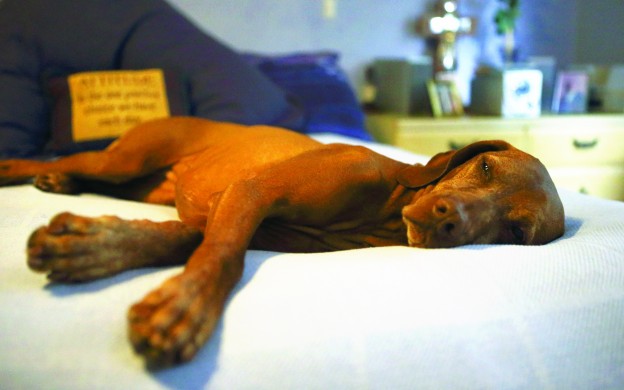
Lymphoma is an aggressive disease with no cure, but following a cancer-friendly diet in conjunction with your vet can help your pooch fight through treatment and have the best chance at a long remission, writes Mel Hearse.
There are few diagnoses less welcome to a dog owner than hearing their beloved pet has cancer. While cancer comes in all shapes, sizes and types, lymphoma is one of the more common cancers and sadly, it isn’t curable. On the plus side, a growing body of research shows cancer-controlling diets can help slow the progress of the lymphoma and lengthen remission time.
One of the biggest concerns for dogs with lymphoma is the development of cancer cachexia. Dr Gregory Ogilvie, a pioneer in canine cancer nutritional research, explains it is a metabolic condition during which the dog experiences weight loss, loss of appetite, fatigue and impaired immune function. It can change the way the dog’s body metabolises carbohydrates, proteins, and fats, often resulting in increased energy use by the cancer. In some cases, cachexia can actually be the cause of death.
Treatment through nutrition
While many owners will seek chemotherapy treatment for their dogs, diet still plays a very important role and works well in conjunction to other treatment methods — though it’s important to note the research is relatively young and still ongoing. Dr Ogilvie and other canine cancer experts recommend a diet which consists of limited quantities of simple sugars, moderate amounts of complex sugars, high-quality digestible proteins (in moderate amounts), and specific amounts of certain types of fat.
So what is the science behind his recommendations? He explains cancer cells feed on sugar and rob stores of amino acids. Veterinarian and author of the Dog Cancer Diet, Dr Demian Dressler, adds that cancer is a junk-food junkie and says cutting out any foods that are sugary — or that break down easily into simple sugars — is very important. “Most forms of corn and wheat break down into simple sugars, and these are often major ingredients in some commercial pet foods and treats.”
But not all carbs are bad. In fact, Dr Dressler says complex carbs are very important and should be consumed by your pet on a daily basis as they’re a good source of energy for your dog’s body while fighting cancer. Complex carbohydrates include breads, cereals, grains, rice, potatoes, vegetables, fruits and pasta. “Oatmeal and brown rice are both good sources of energy. There is even some evidence that the polysaccharides in bran are cancer-fighters,” he says.

Fats and protein
Dr Ogilvie’s research found tumour cells cannot readily use fats, so as well as recommending a diet low in carbs, he suggests your dog’s diet be high in quality protein and fats, particularly to help reduce the likelihood of cancer cachexia as a result of depleted body fat stores. Fat provides more energy than carbohydrates or proteins and transports the fat-soluble vitamins A, D, E and K.
When it comes to protein, your dog’s body will essentially end up fighting the tumour for available protein, which means there will be far less protein available for maintaining muscle mass, and can also lead to poor immunity and delayed wound healing. Digestible proteins include egg whites, chicken (white meat), lean beef, beans, skim milk and lamb.
Supplementation
Supplements containing vitamins, minerals, garlic, tea and shark cartilage have long been used in the prevention, control and treatment of cancer for decades. Dr Ogilvie’s research shows that while some have been shown to make negligible differences in clinical trials, there is some support for use of others.
He says retinoid, beta carotene and vitamins C, D and E have shown some positive results, as have minerals including selenium, copper, zinc, magnesium, calcium, lead, iron, potassium, sodium, arsenic, iodine and germanium. L-asparaginase and garlic have both been shown to have anti-cancer benefits, though vets warn too much garlic can be harmful so use with caution.
While it may be a while before dogs and cats acquire the taste for tea, Dr Ogilvie says compelling data suggests that green and black teas may have anti-cancer properties. “Black tea seems to have soothing properties to reduce the discomfort associated with radiation,” he says.
Dr Dressler says a healthy immune system is very important for fighting cancer. In addition to supporting the immune system, omega-3 fatty acids can also help to offset the effects of excessive omega-6 fatty acids in your dog’s body. He recommends three sources of omega-3 fatty acids — one being liver, the other krill oil and fish oil. He recommends picking one of these oils, using it for three to four weeks, and then switching to the other, alternating oils throughout the treatment.
Commercial versus homemade diets
There are a number of scientifically researched commercial foods available for dogs with cancer, and if you are unsure of preparing your own foods, they provide a convenient and foolproof way of providing a cancer-fighting diet for your dog. Your best bet is to talk to your vet for advice, but when choosing a food, look for a highly palatable food where 30-50 per cent of the calories come from a good-quality protein source, 50-60 per cent of the calories come from fat, and the rest of the calories come from carbohydrates.

A word on raw
There are many sites and sources that will recommend a raw diet for cancer fighting, but Dr Dressler disagrees. He points out microbes like E. coli (sometimes found in ground red meat) and other microbes grow over time on the surface of just about any meat, chicken, pork or fish product, even when they are refrigerated in plastic. “The longer the time between killing the animal and eating it — and some meat you buy at the supermarket has been stored for weeks or months after being killed — the more likely these foods are to have large populations of surface microbes, which tend to multiply exponentially.”
He recommends boiling food to reduce the risk of carcinogens being created through the cooking process, and advises preparing vegetables like this as well. Dr Dressler points out that a dog’s gut doesn’t break down vegetables easily and feeding your dog completely raw vegetables may prevent the animal from getting as much nutrition as possible.
He cautions anything you read about fighting cancer and your pet’s diet (including his own information) should always be discussed with your veterinarian, oncologist, and/or any other professional who is involved in your dog’s health because all dogs and their cancers are unique.
For more on treating canine lymphoma
Caninecancer.org.au together with CLEAR will be bringing an award-winning canine lymphoma documentary to Australia. My Friend: Changing the Journey will be showing in major cities from July 2015. Visit caninecancer.org.au/changingthejourney.html for more details.
You need to look after your pooch's health - check out our all-new DOGSLife Directory




The Changing The Journey event video can be found on this page. You will also hear from Dr Greg Ogilvie and Dr Sue Ettinger who appeared via Skype at the Perth event.
http://www.caninecancer.org.au/lymphoma.html